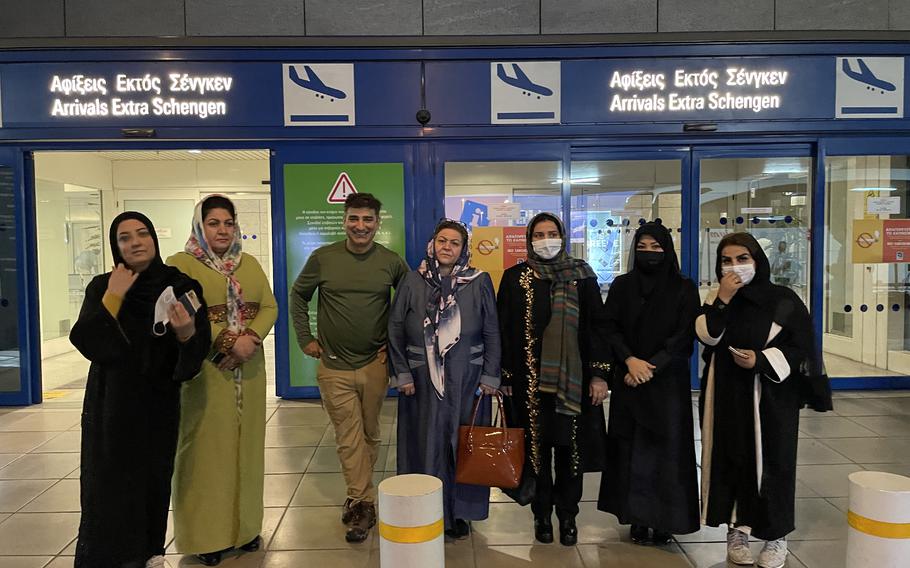
Amed Khan, a New York-based philanthropist, center, stands in Athens airport with female lawmakers he helped escape Afghanistan. (Vaggelis Xafinis/for The Washington Post)
The female lawmakers were moving from house to house, trying to stay one step ahead of the Taliban fighters they feared were stalking former government officials since taking over Afghanistan last month.
The militants controlled Kabul airport, threatening one escape route. At the borders, security was more relaxed, but most neighboring countries had declined to give visas to the women. And no help came from the United States, which had worked with at least one of the lawmakers.
“We didn’t see any hope,” said Homaira Ayubi, a lawmaker once hailed as a “success story” by the U.S. Agency for International Development for her anti-corruption work.
Then, earlier this month, Amed Khan, a New-York based philanthropist who was part of a group of NGO workers and private citizens trying to help the lawmakers, was sitting in a car in Uzbekistan staring at Google Maps when he had a radical idea.
“How can we get the Iranians to save the day with regard to U.S. allies stuck in Afghanistan,” he wrote in a text message to a colleague with contacts in Iran’s government, setting off a complex, weeks-long effort to get the women and their families to safety, aided by Afghans who faced significant risk, advocates around the world and Iran, one of America’s most committed adversaries.
A few days after he sent the text, according to Khan, an Iranian diplomat said his government had agreed to allow the lawmakers and their families to transit through Iran - adding yet another country to the assortment of governments hastily enlisted in the sprawling, leaderless and ongoing global effort to evacuate vulnerable Afghans after the Taliban takeover.
Iran, which is under strict U.S. sanctions, was far from an ideal destination, nearly everyone involved in the evacuation agreed. The Afghans had to weigh whether traveling there would damage their prospects for resettlement in Europe or the United States. Americans involved in the effort had to take care to avoid breaching sanctions.
It was also a delicate matter for Iran, which has reacted with confusion at times to the Taliban takeover. The new hard-line government of President Ebrahim Raisi, which cheered the U.S. withdrawal from Afghanistan, has tried to maintain ties with the Taliban, while at the same time reckoning with a groundswell of Iranian antipathy toward the militants and fears about a resurgence of terrorism next door.
A spokesman for Iran’s government did not respond to questions about its role in the evacuations.
After Iran agreed to take in the lawmakers, there were delays in issuing visas, a scramble to secure airplanes and accommodations, and last-minute panic when Iranian intelligence agents boarded the airplane in Mashhad, Iran, and started questioning the passengers about who was funding the operation.

Amed Khan, a New York-based philanthropist, center, stands in Athens airport with female lawmakers he helped escape Afghanistan. (Vaggelis Xafinis/for The Washington Post)
But early Wednesday, after transiting through Georgia, six lawmakers and their families - 53 people in all - arrived in Greece, which has agreed to shelter them while they apply for asylum in third countries.
“It was very long and chaotic, but we are happy,” said Jamshid Ayubi, Homaira Ayubi’s 28-year-old son, who was in charge of the group as they navigated the roads, border posts and airports all along the way.
The Ayubis said there had been little debate within the family about the need to leave Afghanistan, as wrenching as the decision had been.
“I have never wanted to leave my country and have never left the country despite very good chances,” Homaira Ayubi said in a telephone interview. She worked as a teacher during the Taliban’s first stint in power, in the 1990s. The “Taliban hasn’t changed,” she said. On the day that Taliban militants entered Kabul, the Ayubis fled their rented home in the capital.
Taliban leaders had promised a general amnesty to former government workers, troops and those who had worked with foreign militaries. Even so, reports of retribution trickled in from across the country. In Kabul, fighters were searching homes of parliament members, including Ayubi’s, she said. She and her family had already moved to a relative’s house.
Ten or so days after the Taliban takeover, she and other parliament members attempted to leave through the airport, having been told they had seats on an evacuation flight and that the U.S. military had their names. But after boarding a bus to the airport, they were told at the gates by Taliban fighters that they had no authority to let them enter, because their names were not on any lists the militants had been given, Jamshid said.

Female Afghan lawmakers along with their families ride a bus in Athens after a journey from Afghanistan, through Iran and Georgia, to Greece. (Vaggelis Xafinis/The Washington Post )
“For four, five, six hours, we waited, and no one came to pick us up.”
By then, Homaira had started to receive threatening phone calls. The family believed they were from the Taliban, but she had plenty of enemies, her son said, stemming from her work in parliament exposing corruption.
She shut off her phone. The family started reaching out to neighboring countries and places she had visited as a parliament member to see whether they would issue visas, but received no response.
In an emailed response to questions, a State Department spokeswoman did not say what, if any, assistance the Biden administration had provided to the lawmakers as they tried to leave Afghanistan. The United States “is taking every available measure to assist Afghans who are at risk, particularly those who worked for or with the United States or have supported international efforts,” she said.
As the Ayubis searched for a way out, an ad hoc group of people overseas was looking for ways to help her. The group included Tanya Henderson, founder and executive director of Mina’s List, which supports women’s political leadership and participation globally and had worked with many female Afghan lawmakers.
Despite their prominence and the peril they faced, those lawmakers “just kept getting pushed down to the bottom of the evacuation list,” Henderson said, even as other U.S. allies, including those who had worked with the military, were prioritized for evacuation by the Biden administration.
Khan, the philanthropist and another member of the group, had been able to evacuate other Afghan refugees since the Taliban takeover by leveraging the extensive international connections he had cultivated over a varied career that included stints in the Clinton administration and the nonprofit world.
Khan, a former investor, also had access to the kind of financial resources that allowed him to fly around the world and quickly charter planes costing hundreds of thousands of dollars.
On Sept. 6, he sent a message to Trita Parsi, a Washington-based Iran analyst. They knew each other from their affiliations with the Quincy Institute for Responsible Statecraft, a think tank whose mission includes working to “expose the dangerous consequences of an unaccountable, overly militarized American foreign policy.” Parsi is a co-founder of the group, and Khan sits on the board.
At the time he wrote the message, Khan was sitting in a car in Uzbekistan, a mile from the border with Afghanistan, trying to figure out how the women could escape, he said in an interview. His outreach through informal networks to several countries, including Uzbekistan, had come up short. “What is the fastest, quickest way to get this done,” he remembered thinking, before settling on Iran. It seemed “worth a shot.”
Parsi said he was skeptical he could help, since there was a new government in Iran whose priorities, to him at least, were still unclear. He reached out to an Iranian serving in the diplomatic corps, whom he declined to name, and requested transit visas for the lawmakers and their families. A few days later, the diplomat replied, saying that because the refugees were members of parliament, Iran would be willing to let them in.
Back in the United States, lawyers were consulted to determine whether the Afghan lawmakers would face difficulties as a result of transiting through Iran (probably, the lawyers concluded, according to Henderson). Khan said he was largely unconcerned with the consequences, saying the fate of the lawmakers was a U.S. responsibility, but he made adjustments in any case: for instance, enlisting a friend from Sweden, which has diplomatic relations with Tehran, to charter the plane from Mashhad.
One country that had agreed in the past to take in Afghan refugees balked at accepting travelers transiting through Iran, because of strained relations. So Khan messaged the first lady of Greece, whom he knew socially, and the country agreed to take them in, he said.
Some of the Afghans drove to Herat, an Afghan town about a 90-minute drive from the Iranian border, Jamshid Ayubi said, and other families, including his, took the risk of boarding domestic flights from Kabul. His mother wore a full face covering to avoid being recognized. The family booked their tickets to Herat under false names, he said.
The group spaced out their crossings into Iran, with a few cars traveling every day over the course of a week to avoid attracting attention. “There was a lot of pressure on me to get them there safely,” Jamshid said. “If one thing went wrong, it could affect all the families.”
They had gambled that the border would be less secured, which turned out to be correct. When the Ayubis crossed in a small convoy of battered old Toyota Corollas, the Taliban border guards put exit stamps on the Iranian visas, rather than on the passports of the travelers. And then they were in Iran.
Homaira Ayubi said she was hoping to take her family to the United States and would continue fighting for Afghan causes from abroad. She had been heartened, she added, by the women protesting for their rights in recent weeks in Kabul and other cities.
“The Taliban with this ideology will not last long,” she said.